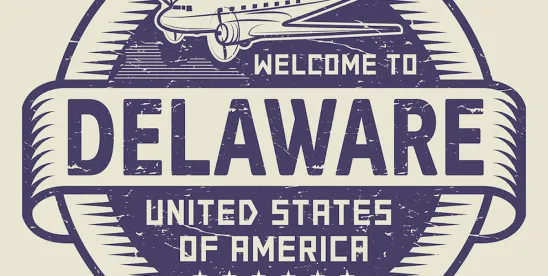The governor of the State of Delaware—consistent with his pledge to protect the “Delaware franchise”—recently signed into law amendments to Section 144 of the Delaware General Corporation Law (the DGCL) relating to certain acts or transactions involving directors, officers, controlling stockholders, and members of a control group, and Section 220 of the DGCL relating to stockholder demands for inspection of corporate books and records.
The amendments to Section 144 are intended to provide greater predictability and clarity to Delaware corporations considering acts or transactions that may implicate the fiduciary duties of directors, officers, controlling stockholders, and members of a control group. The amendments to Section 220 are intended to provide clarity and certain limits on stockholder inspection of books and records given the increasing growth in volume and scope of stockholder actions for inspection brought in the Delaware Court of Chancery.
Amendments to Section 144
The amendments to Section 144 provide safe harbor procedures for acts or transactions involving one or more directors, officers, controlling stockholders, and members of a control group that might, absent compliance with the safe harbor procedures, give rise to breach of fiduciary duty claims. The amendments to Section 144 also exculpate controlling stockholders and members of a control group from liability for duty of care violations.
The safe harbor provided by amended Section 144 is protection from equitable relief or an award of damages by reason of a claim based on a breach of fiduciary duty.
Safe Harbor for Acts or Transactions Solely Involving Directors or Officers
Acts and transactions involving one or more directors or officers or in which one or more directors or officers have an interest get the benefit of the safe harbor under amended Section 144(a) if:
- The material facts as to the relationship or interest and the act or transaction are disclosed or known to all members of the board or a committee of the board and the act or transaction is authorized in good faith and without gross negligence by (i) the affirmative votes of a majority of the disinterested directors (see below) on the board (except where less than a majority of directors on the board are disinterested directors) or (ii) a majority of the disinterested directors on a committee (where less than a majority of the directors on the board are disinterested directors, the committee must consist of at least two disinterested directors), even though the disinterested directors constitute less than a quorum; or
- The act or transaction is approved by an informed, uncoerced, affirmative vote of a majority of the votes cast by the disinterested stockholders (see below); or
- The act or transaction is fair as to the corporation and its stockholders.
Safe Harbor for Acts or Transactions (Other Than Going Private Transactions)
Involving a Controlling Stockholder or Control Group. Acts or transactions between the corporation or one or more of the corporation’s subsidiaries on the one hand and a controlling stockholder (see below) or control group (see below) on the other hand and acts or transactions from which a controlling stockholder or control group receives a financial or other benefit not shared with the stockholders generally (each a Controlling Stockholder Transaction) get the benefit of the safe harbor under amended Section 144(b) if:
- The material facts as to the Controlling Stockholder Transaction are disclosed or known to all members of a committee of the board (consisting of at least two disinterested directors) that has been expressly delegated by the board the authority to negotiate or oversee the negotiation of and reject the Controlling Stockholder Transaction and the Controlling Stockholder Transaction is approved or recommended for approval in good faith and without gross negligence by a majority of the disinterested directors then serving on the committee (Disinterested Committee Approval); or
- The Controlling Stockholder Transaction is conditioned—by its terms (as in effect at the time it is submitted to stockholders for approval or ratification)—on approval or ratification by an informed, uncoerced, affirmative vote of a majority of the votes cast by the disinterested stockholders and such approval or ratification is obtained (Disinterested Stockholder Approval); or
- The act or transaction is fair as to the corporation and its stockholders.
Safe Harbor for Going Private Transactions Involving a Controlling Stockholder or Control Group
A “going private transaction”—defined as a Rule 13e-3 transaction (for a corporation having a class of stock listed on a national securities exchange) or a Controlling Stockholder Transaction in which all of the capital stock held by disinterested stockholders is canceled, converted, purchased, or otherwise acquired or ceases to be outstanding (a Going Private Transaction)—gets the benefit of the safe harbor under amended Section 144(c) if:
- The Going Private Transaction receives Disinterested Committee Approval and Disinterested Stockholder Approval; or
- The act or transaction is fair as to the corporation and its stockholders.
Defining a “Controlling Stockholder,” “Control Group,” “Disinterested Director,” and “Disinterested Stockholder”
For purposes of applying the above safe harbor procedures, amended Section 144 defines the foregoing key terms as follows:
A “controlling stockholder” means a person that, together with affiliates and associates:
- Owns or controls a majority in voting power of stock entitled to vote generally in the election of directors or in the election of directors having a majority in voting power of all directors; or
- Has the right (by contract or otherwise) to cause the election of its nominees to the board and such nominees constitute a majority of all directors or a majority in voting power of all directors; or
- Has the power functionally equivalent to that of a stockholder owning or controlling a majority in voting power of stock entitled to vote generally in the election of directors by virtue of ownership or control of at least 1/3 in voting power of stock entitled to vote generally in the election of directors or in the election of directors having a majority in voting power of all directors and power to exercise managerial authority over the corporation’s business and affairs.
- A “control group” means two or more persons that are not controlling stockholders but by virtue of “an agreement, arrangement, or understanding” between or among them constitute a controlling stockholder.
- A “disinterested director” means a director who is not party to the relevant act or transaction and does not have a material interest in, or a material relationship with a person that has a material interest in, the relevant act or transaction. Amended Section 144 also contains a rebuttable presumption as to the “disinterestedness” of directors satisfying the independence criteria of the national securities exchange (modified as provided in amended Section 144) on which a class of the corporation’s shares are listed.
- A “disinterested stockholder” means a stockholder that does not have a material interest in the relevant act or transaction or a material relationship with either the relevant controlling stockholder or a member of the relevant control group or any other person with a material interest in the relevant act or transaction.
Defining a “Material Interest” and “Material Relationship”
Section 144 also defines the key terms “material interest” and “material relationship” as follows:
- A “material interest” means an actual or potential benefit (including avoidance of a detriment), other than one devolving on the corporation or the stockholders generally, that (i) in the case of a director, would reasonably be expected to impair the objectivity of the director’s judgment when participating in the negotiation, approval, or authorization of the relevant act or transaction and, (ii) in the case of a stockholder or other person that is not a director or officer, would be material to the stockholder or other person.
- A “material relationship” means a financial, employment, familial, professional, or other relationship that (i) in the case of a director, would reasonably be expected to impair the objectivity of the director’s judgment when participating in the negotiation, approval, or authorization of the relevant act or transaction and, (ii) in the case of a stockholder, would be material to such stockholder.
Amendments to Section 220
The amendments to Section 220 define the scope of books and records that a stockholder may demand to inspect and set forth conditions that must be satisfied for the stockholder to inspect a corporation’s books and records.
Scope of Books and Records That May Be Inspected by a Stockholder
Amended Section 220 generally defines the “books and records” of the corporation that a stockholder may inspect as the certificate of incorporation, bylaws, minutes of meetings (or consents in lieu of meetings) of stockholders (for the preceding three years) and the board or committees of the board, communications with stockholders generally (within the prior three years), materials provided to the board or committee in connection with action taken by the board or committee, annual financial statements (for the preceding three years), D&O questionnaires, and contracts made by the corporation with one or more current or prospective stockholders (or one or more beneficial owners of stock), in its or their capacity as such, entered into under Section 122(18) of the DGCL.
Where the corporation does not have any minutes or consents of stockholders (for the preceding three years) or the board or committee, annual financial statements (for the preceding three years), or, in the case of a corporation having a class of stock listed on a national securities exchange, D&O questionnaires, the Delaware Court of Chancery may order the corporation to produce the functional equivalent of these books and records if the stockholder has complied with the conditions to inspection set forth in Section 220(b) and only to the extent necessary and essential to fulfill the stockholder’s proper purpose.
In addition, the Delaware Court of Chancery may order the production of other specific records if and to the extent (i) the stockholder has complied with the conditions to inspection set forth in Section 220(b), (ii) the stockholder has demonstrated a compelling need for the inspection of the records to further such stockholder’s proper purpose, and (iii) the stockholder has demonstrated by clear and convincing evidence that the specific records are necessary and essential to further the proper purpose.
Conditions to Stockholder Inspection
Amended Section 220(b) requires a stockholder demanding inspection of the corporation’s books and records to:
- Make its demand in good faith and for a proper purpose (e.g., a purpose reasonably related to the stockholder’s interest as a stockholder); and
- Describe with reasonable particularity in its demand for inspection the stockholder’s proper purpose and the books and records sought to be inspected (which books and records must be specifically related to the stockholder’s proper purpose).
Amended Section 220(b) expressly permits the corporation to:
- Impose reasonable restrictions on the confidentiality, distribution, and use of the books and records inspected;
- Require that the stockholder agree to incorporate information contained in the books and records inspected by the stockholder by reference in any compliant filed by or at the direction of such stockholder relating to the subject matter of demand; and
- Redact portions of the books and records not specifically related to the stockholder’s purpose.
Effective Date of the Amendments
The amendments to Section 144 and Section 220 became effective upon signature by the governor on 25 March 2025 and apply to acts and transactions occurring before, on, or after such date, except for actions or proceedings that are completed or pending, or any demands for inspection made, on or before 17 February 2025.





 />i
/>i

